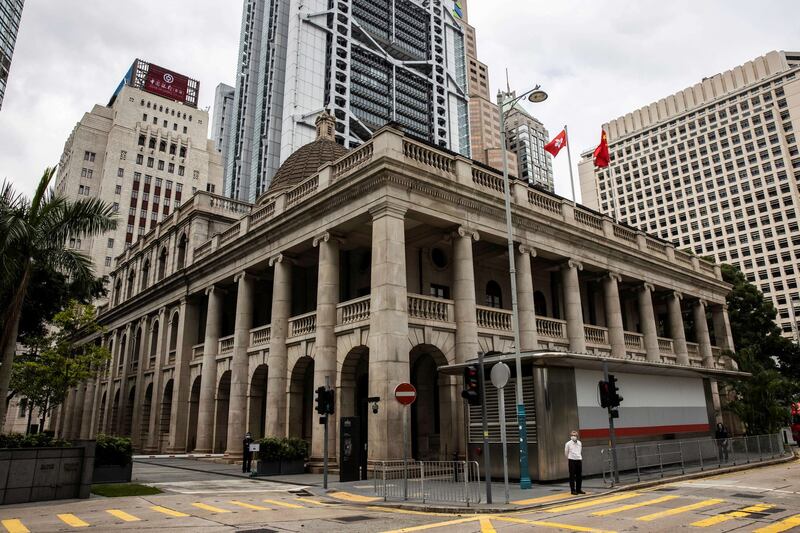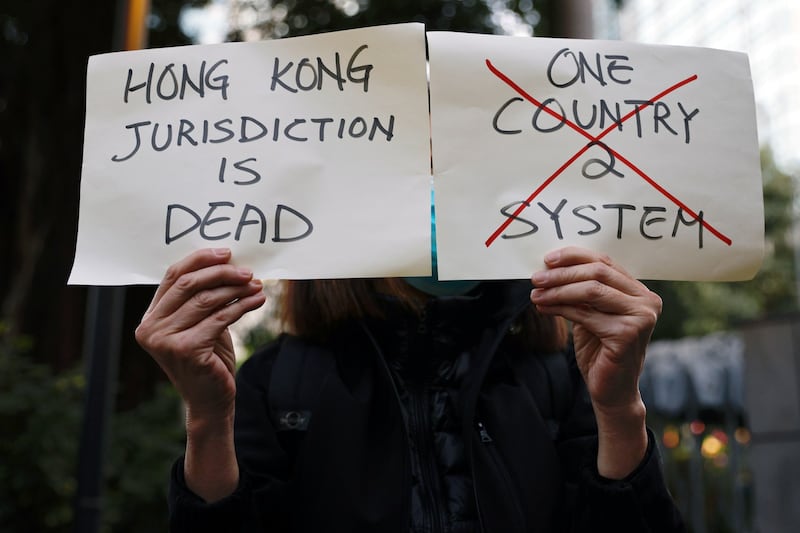A decision by Hong Kong’s top court in August to uphold the convictions of seven of Hong Kong’s most prominent pro-democracy activists, including newspaper publisher Jimmy Lai, has not only raised fears for freedom of the press but also questions about the role of foreign judges.
One of the quirk’s of Hong Kong’s system negotiated when Britain handed it back to China in 1997 was foreign judges in the judiciary. They have long been upheld as a testament to the commitment to the rule of law.
But criticism is growing that they legitimize an administration that fails to uphold values of political freedom and freedom of expression.
Chris Patten, the last British governor of Hong Kong, made a pointed remark after the Hong Kong court’s August ruling, describing the verdict as one that “revealed the rapidly deteriorating state of the rule of law in Hong Kong.”
“This unjust verdict is further compounded by the involvement of Lord Neuberger, a former head of Britain’s Supreme Court, in this decision,” he said.
David Neuberger is a British judge who served as the president of the British Supreme Court from 2012 to 2017. After his retirement, Neuberger participated in Hong Kong’s judicial system as part of the Court of Final Appeal, or CFA, which has the power of final adjudication and the ability to invite judges from other common law jurisdictions to join the court when necessary.
He said in August his role as a judge in Hong Kong was to decide cases that come before him according to the law.

Why does Neuberger sit at the CFA?
Hong Kong’s CFA was established on July 1, 1997, as part of the city’s legal framework under the Basic Law, which serves as its mini-constitution.
The CFA replaced the Judicial Committee of the Privy Council in London as Hong Kong’s highest court after the end of British colonial rule.
The Basic Law set out the city’s judicial system, which includes the CFA, the High Court, District Court, magistrates’ courts, and other specialized courts. It also ensured that Hong Kong’s common law system would continue.
Cases in the CFA are heard by the chief justice, three permanent judges chosen by the chief justice, and a non-permanent judge who can be from Hong Kong or another common law jurisdiction. They are also selected by the chief justice.
Under the Hong Kong Court of Final Appeal Ordinance, an overseas non-permanent judge must be a judge or a retired judge of a court of unlimited jurisdiction in either civil or criminal matters in another common law jurisdiction. They should also ordinarily reside outside Hong Kong. There are no restrictions on the type of cases an overseas judge may preside over.
Government officials and legal figures in Hong Kong often cite the presence of overseas judges as proof of international confidence in the independence of Hong Kong’s judiciary.
As of Sept. 11, there were seven overseas non-permanent judges at the CFA.

What are the recent debates?
The engagement of overseas judges has come under public scrutiny, particularly after some resignations following the implementation of a Beijing-imposed national security law in June 2020.
The United States, Britain and other countries have criticized the law under which many Hong Kong residents have been prosecuted for dissent and media outlets shut.
Only judges nominated by the city’s chief executive can sit on national security cases but the list of nominees is not made public, media has reported.
The Hong Kong government said that any judge, regardless of nationality, was “eligible for designation” under the national security law, but in the small number of national security law cases that have reached the top court, no overseas judge has sat.
A pro-establishment barrister and government adviser, Ronny Tong, questioned whether the city needed judges who owe their allegiance to other countries. They should not preside over national security cases, particularly if they came from countries “hostile to China or Hong Kong,” he said.
Social media critics question the foreign judges’ “luxurious” lifestyle.
They are flown into Hong Kong on an ad hoc basis, enjoying first class travel and a generous salary for their visits, which typically last 29 days, media critics said.

What are the foreign judges’ positions?
Some of foreign judges who have stepped down since 2020 have questioned their roles under an administration that they say no longer respects basic rights and freedoms.
In 2020, senior Australian judge James Spigelman cited the impact of the National Security Law as he stepped down.
Two years later, U.K. Supreme Court justices Robert Reed and Patrick Hodge resigned following concerns raised by the British government. Other British judges, Jonathan Sumption and Lawrence Collins, resigned in June.
Collins cited the "political situation in Hong Kong" in a brief statement about his departure, while Sumption wrote in the Financial Times that Hong Kong was "slowly becoming a totalitarian state".
“The rule of law is profoundly compromised in any area about which the government feels strongly,” Sumption said, adding that it was “no longer realistic” to think that the presence of overseas judges could help sustain the rule of law in Hong Kong.
A spokesperson for Hong Kong’s judiciary said in June that its “operation will not be affected by any change in membership of the court”.
Hong Kong’s government rejects any suggestion that the courts are subject to political pressure. It says the national security law, introduced after mass protests in 2019, was necessary to ensure the stability that underpins the financial hub’s prosperity.
Edited by Mike Firn.
